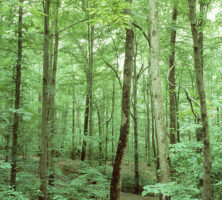The Fernbank Science Center in Atlanta is a unique combination of urban forest, planetarium, observatory, and exhibit hall. It sits on four acres of land in DeKalb County on the edge of a sixty-five-acre primeval forest preserved for educational purposes. The center’s mission is to increase the public’s science literacy and to improve science education at the local, state, and nation levels, with particular focus on the DeKalb County School System.

Courtesy of Fernbank Science Center
Fernbank Forest
Fernbank Forest was purchased from Z. D. Harrison in 1937 by a group of citizens who were interested in conserving and preserving the forest area for science education. In 1964 the Fernbank Trustees leased the forest for public and school use to the DeKalb County Board of Education, stipulating that the area be protected and maintained in as close to its natural state as possible.
Fernbank Forest is a tract of relatively undisturbed mature mixed-hardwood forest, a remnant of the type of forest vegetation that originally covered the Piedmont region of Georgia, including the Atlanta metropolitan area. Nearly all of Atlanta’s original vegetation has been destroyed, first by farming and later by urban and suburban development. Visitors to Fernbank Forest can observe firsthand the primeval beauty of forest land as early explorers and southern Native Americans must have done hundreds of years ago.

Courtesy of Fernbank Science Center
Fernbank Forest is used as a “living laboratory” throughout the year. During school hours, Fernbank Science Center biology and horticulture instructors offer a variety of scheduled programs in Fernbank Forest to visiting students. In the afternoons and on weekends, visitors can walk the one and a half miles of paved trails, accompanied by trail guides knowledgeable in such areas as tree identification, wildflowers, or forest ecology.
Science Center and Museum
The Science Center building was completed and dedicated in December 1967 at a cost of about $1 million, which was generated by a school bond issue. The Science Center now operates on a budget from the DeKalb County School System. In 2005 there were eighty-one employees.
In 1989 the special relationship between Fernbank Science Center and Fernbank Inc. was formalized in a public ceremony during which both groups were designated as Partners-in-Education. In October 1992 Fernbank Inc. opened the new 160,000-square-foot Fernbank Museum of Natural History.
Observatory and Planetarium
The Fernbank Observatory houses the largest telescope in the southeastern United States, a 0.9-meter (36-inch) Cassegrain reflector, beneath a 10-meter (30-foot) dome. One of the largest instruments ever dedicated to education and public viewing, the telescope is used for observations of the moon, planets, and such deep-sky objects as nebulae, star clusters, and galaxies. Astronomy programs at the observatory range from the second-grade to college levels and also include adult education courses and public viewing.

Image from Ryan Stavely
Since its opening in 1967, the Science Center’s Jim Cherry Memorial Planetarium has attracted nearly 5 million visitors. As of 2004 the planetarium still ranks as one of the largest in the country. The German-built Carl Zeiss Mark V projector is the centerpiece of the facility and is used, along with more than 200 other projectors, to present programs written and produced by the planetarium staff.
Exhibit Hall
The exhibit hall at Fernbank Science Center spans some 9,000 square feet and circles the planetarium’s theater. Some of the highlights in the exhibit area include an Apollo 6 space capsule, moon rocks, georgiaites, animals of the Okefenokee Swamp, songbirds of the Fernbank Forest, rocks and minerals, and a live bee exhibit.










